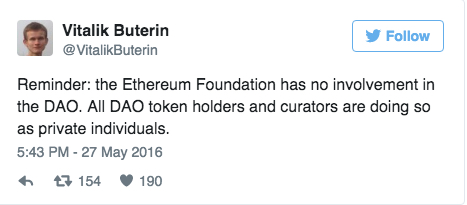To DAO or Not to DAO?
Over the past couple of weeks, talk of The DAO], or decentralized autonomous organizations in general, has dominated the blockchain space. News of a near US $150 million (12 percent of total Ethereum tokens) investment from a network of investors has questions being asked, many of which fall within range of whether or not such a system is even viable.
Over the past couple of weeks, talk of The DAO, or decentralized autonomous organizations in general, has dominated the blockchain space. News of a near US $150 million (12 percent of total Ethereum tokens) investment from a network of investors has questions being asked, many of which fall within range of whether or not such a system is even viable.
DJ Pangburn wrote in his article, The Humans Who Dream of Companies That Won’t Need Us, “A DAO or DAC, operated by servers around the world, would exist within no borders and, in theory, be very difficult to shut down.”
A borderless organization, the epitome of enterprise decentralized. The DAO is marketed as a faceless corporation of investors who operate democratically, as a flat shareholder base, voting on budgetary decisions down to the very protocol that automates the entire process.
Trust is placed in the collective, in the crowd, a homogenous group of investors with myriad interests, diverse tastes for risk, of knowledge, and maybe even insight.
So while the inner workings of The DAO as a crowdfunding vehicle is automated, the collective of minds and the decisions afforded to them are not — and so the picture of inefficiency, indecisiveness and lack of top-end leadership begins to paint itself.
It’s not necessarily a chaotic system, there is order set by the governing contract (DAO 1.0).
But from an objective position, someone who has no vested interest or stake in the Ethereum-based crowdfunding vehicle, it seems a decentralized organism lacks something so pivotal to success in business — to entrepreneurship — especially early on, that is, a central guiding force.
Without a chief executive or executive core to guide the ship, to feed wind into the sails when no advancement is being made, or progress has plateaued, or worst, slowed, how does the course correct?
Leadership is still a core ingredient to business success. The expectation that communications innovation removes that need for strong overarching management is a romantic thought though also quite idealistic.
A digital company, without an attached legal entity, fully decentralized and community-led is certainly a fascinating experiment, on multiple levels — socially, economically, politically and more — but so was the Soviet Union’s attempt at socialism.
A decentralized system is progressive in terms of governance, but the resounding question is whether such a governance model is the most effective, efficient and sturdiest apparatus capable of providing the support and backbone required to combat the troughs and peaks that exist in everyday business.
An article published by DAOhub on May 28 led with the statement: “The DAO contract, or “DAO 1.0”, is an innovation in governance because it is decentralized, provably democratic, immutable, efficient and has a relatively low barrier to entry.”
The following paragraph: “Improvements in performance are what will come together to form “DAO 2.0”, governance solutions made possible thanks to the Ethereum turing-complete blockchain.”
But governance cannot be separated from performance.
How something is conducted — the policies, the actions in response to various affairs — is directly related to results.
The DAOhub article reiterated that decentralizing corporate power, maintaining “a completely flat shareholder democracy … isn’t much of an innovation performance wise.”
As such those seeking to improve the DAO contract are proposing an adaptation to the DAO’s cryptogovernance framework and rules, termed DAO 2.0 pre-proposals.
These DAO 2.0 solutions, as the article states, can be thought of as applying to two separate layers of cryptogovernance: voting and census, utilizing principles of liquid or delegative democracy, quadratic voting and a second layer based around predictive markets within a futarchy-based system. The latter ostensibly creates an incentive for investors to invest wisely.
So already we are witnessing a shift in decision-making powers. And maybe this is the evolutionary path to take. Decentralizing opens the door to subjectivity, and despite the common goal, the means to the end can be perceived or desired differently, across DAO members, for a multitude of reasons.
The Economist published a piece last week titled, The DAO of accrue, which stated:
Schemes of this kind have not done well. The crowd may have wisdom, but not a lot of commitment. Similar but smaller vehicles operated by a firm called BitShares, for instance, are suffering from a lack of participation in votes, in large part because it takes time and energy to consider proposals. Investors in the DAO can also withdraw money not yet committed to a project at will. This means that the $150m in ether could quickly vanish into the, er, blue if investors got nervous.
Something additionally strange is the dissociative leadership. Vitalik Buterin, one of the “Curators” of The DAO, and of course Ethereum co-founder and a fellow investor in The DAO, tweeted out:
This disconnect is odd because it feels forced. Granted, the contract is immutable. However, suggesting “no involvement” is deceptive when you form part of the fail-safe, and are the principal party in the underlying currency that fuels the organization — not to mention actors with private stakes in the organization.
Further, by the very nature of being token holders, private individuals yes, but included and with vested interests to see the entity succeed, they are involved members. And from that there drifts a sense of naivety in the entire idea of trying to decentralize a corporate structure.
Even more, this speaks to an arguable aspect of The DAO, which is whether it is truly a faceless entity. But that’s another argument for a separate time.
DAO 2.0, the delegative voting structure (which is the beginnings of a hierarchical foundation) and the incentivizing nature of a futarchist system may also help stave off disinterest and propel wise decision-making.
But it could also act as a disincentive, creating a greater barrier to participation for those users who may find the system too challenging or confusing, and therefore off-putting. Maybe, decentralizing corporate structure simply makes for an indecisive mess made by mathematics.
A peer-to-peer construct may be facilitated by technologies of today and in future, but that doesn’t mean they ought be incorporated in every use-case.
One thing is certain, there are many interested in seeing where it all goes, success or failure.
An automated crowdfunding organization operating under a democratic principle, whatever the degree, is an interesting experiment — history in the making — in the case of either result.
Here’s a few of the top stories from last week:
R3 Signs Insurance Company Ping An Group, Possibly Partnering with Ripple
Signing is the tech innovation firm’s first Chinese addition to consortium
The second-largest insurance company in China, Ping An Group, became the first Chinese member of the global R3 CEV-led consortium. R3 CEO David Rutter said the addition of Ping An was "an important milestone."
Ping An Group’s Chief Operating Officer Jessica Tan, said the company was, “looking forward to developing and using blockchain technology to create a more efficient way of managing financial assets digitally.”
In addition to the high-profile Chinese signee, R3 was also in headlines with a supposed deal between the technology innovation firm and payment network, Ripple.
Chris Larsen, CEO at Ripple, had tweeted out on May 19: “The future of fintech is bringing together like-minded companies, like @R3CEV and @Ripple. More details to come soon…,” Larsen tweeted.
European Parliament OK to ‘Wait and See’
The EU institution voted in favour of staying on the fence to allow blockchain tech to breathe
Last week news out of Europe arose when the European Parliament, the directly elected parliamentary institution of the European Union (EU), decided to remain mum on blockchain technology, delaying policy action to allow the sector to breathe and develop.
Members of the European Parliament (MEPs) voted in favour of a “wait and see” approach, perhaps a sign the technology is still very much in its infancy, in its capacity and understanding, especially within political circles.
“As with any new tech, we are at an early stage. So what we advocate is not to stifle innovation by regulating too early,”
— – MEP Jakob von Weizsäcker.
Parliament also voted in favour of setting up a task force to monitor progress of blockchain technology presumably to maintain a readiness to apply regulations when the time arrives.
Russia With Plans for Central-Issued Digital Currency
Deputy Director says, ‘discussions are currently ongoing’
Russia can now be added to the list of countries in talks to launch a centrally-issued digital currency.
‘However as an accounting unit, these ‘coins’ or whatever are they called, they can be used, and their adoption becomes wider and wider. As some kind of unit in some account, probably, it’s possible."
— – President Vladimir Putin
Russia has taken a strong stance against Bitcoin and other cryptocurrencies in general, anonymity, which only heightens the overall lack of control, playing as central factors to the seemingly eventual move to outlaw circulation of all cryptocurrencies save for state-issued kinds.
A Few Dates Ahead:
Blockchain Dublin
Just around the corner, the premiere event kicks off Jun. 7, featuring talks, panels, demonstrations and time to engage with attendees and speakers. Visit: blockchaindublin.com.
Blockchain Congress
Showcasing speakers from R3 CEV, Santander, Alliance and more, the two-day event runs Jun. 15-16 in New York at The Lamb’s Club. Visit: blockchaincongressusa.com.
Blockchain Training Conference
The first blockchain event offering a globally recognized certificate, the Toronto event being held on Jun. 20-21, will cater to all levels and will provide attendees with practical hands-on training from accounting, legal, and technical experts who work with blockchains regularly.
Visit: blockchaintraining.org.

Don’t miss out – Find out more today





